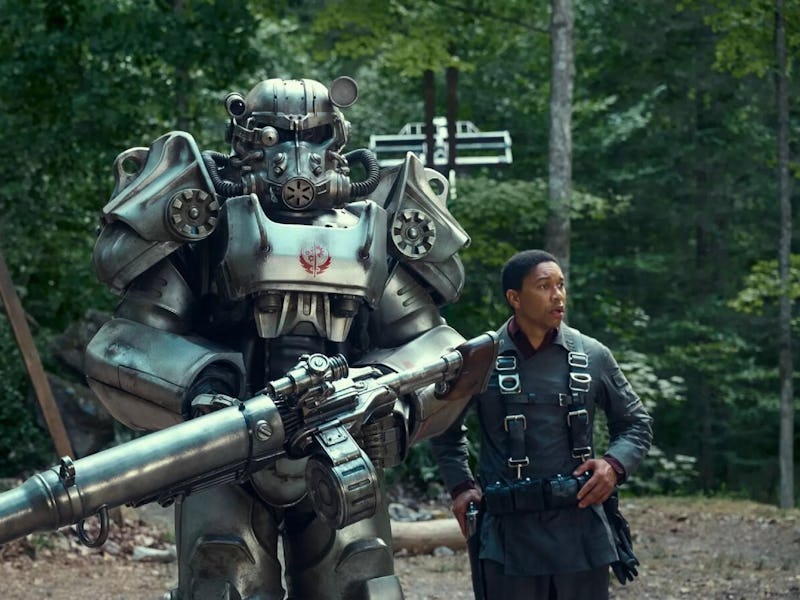Everyone Is an Idiot In the Fallout TV Show, and I Love It
A world filled with hapless heroes.

My favorite thing about Fallout games is how every single one lets more roleplay as an absolute dope, stumbling their way into, somehow, saving the world. While my eyes glaze over at a lot of the monotonous exploration and base building in Fallout 4, the undeniable charm of its weird world and hapless inhabitants keeps me coming back. That’s exactly what makes me so happy about Amazon’s Fallout TV series. Every character consistently makes the dumbest decisions possible and, really, that’s what Fallout is all about.
It’s pretty typical of post-apocalyptic media to sport dark and brooding tones, just look at the other big video game adaption The Last of Us. But Fallout has always been a bit different. The game series has been heavily inspired by retrofuturist works, fully embracing the post-conflict culture of the United States. Aesthetically, this has always given Fallout a very 1950s look, while a sense of dark humor and irony has always been central to the series’ writing, with both the original games developed by Black Isle and the newer games from Bethesda.
Fallout captures the look and aesthetic of the games well, complete with all the old-timey music you could want.
Fallout Tactics has a group of cows playing poker and speaking English, until you get close and they start only saying “Moo” to try and hide it. In Fallout 3, a merchant tells you they sell implants, and you can respond with a straight face, “You sell plants, too?” Fallout 2 even lets you beat an intelligent scorpion in chess by using a strategy you learned from a talking plant. The series has always been deeply unserious in the best of ways, even as it tackles more mature themes like the warmongering of humanity, the dangers of capitalism, and the greater good.
The crux is that you have this weird mishmash of dark ultraviolence and absurdist humor — and it works. The Fallout TV series isn’t perfect (namely, it has some pacing problems), but it manages to perfectly capture that strange brew unique to Fallout.
Like most stories set in the Fallout world, things start out in the Vault, introducing us to a young dweller named Lucy. Life inside the Vault is perfect and idyllic, until it suddenly isn’t, and Lucy is forced to go to the surface in search of a loved one. From here the show follows a trio of protagonists: the naive Lucy, who has no idea how what life on the surface is like; an inexperienced member of the Brotherhood of Steel named Maximus; and a cool courier known only as The Ghoul.
I obviously don’t want to spoil too much of the show, but the best way I can describe it is that all three of these characters possess the Idiot Savant perk from Fallout 4. In the game, this perk had a random chance to multiply your experience by three, and the chance of this perk activated goes up depending on how low your Intelligence stat was.
Idiot Savant was a perk in Fallout 4 that essentially rewarded you for making your character as dumb as possible.
At every opportunity, the show’s characters make the most boneheaded choices imaginable, but I quickly found out that I couldn’t get enough of it. Lucy is completely blinded by her faith in humanity, and time and again, that faith gets hilariously shattered. Maximus is desperately trying to act like a “cool guy” who’s part of the Brotherhood, but always ends up embarrassing himself. The Ghoul is obviously the grizzled veteran of the group, but even he consistently underestimates situations because of overconfidence, due to his extreme healing as a Ghoul. Some interesting deeper layers to these characters do start to unravel, especially as they interact with each other, adding some compelling arcs that feel meaningful.
So much of the fun, however, lies in seeing these characters realize the systems they’re part of are shams, absolute idiotic shams trying to control a world that constantly wants to bring itself to ruin. These three characters want to be better, but the core struggle of the show revolves around whether they can really afford to do that. After all, their enemies, like the random bandits they meet or the posh robot with a penchant for extracting organs, are brutal and nonsensical.
Everyone in Fallout makes the worst decisions possible, but in this case, it’s a good thing.
I thought I was pretty much done with Fallout games, the series had its moment for me. But the Fallout TV series captured the “vibe” of the franchise so well, and reminded me of what made it so compelling in the first place. I’ve found myself jumping back into Fallout 4 in the days since I finished the show, and getting further than I ever had before.
The eight-episode series is a bit light on the action, and a bit off-kilter with the pacing, but the sheer irreverence of its world and characters is delightful at every turn. I do wonder how much traction the show might find with audiences that haven’t played the games, but as an “adaption” of the source material, I couldn’t have asked for much more.